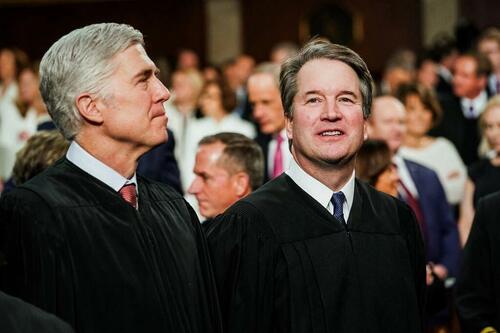Justice Kavanaugh Warns Of Vicious Cycle Of Malicious Prosecutions That Could End Presidency
Authored by Tom Ozimek via The Epoch Times,
During Thursday’s deliberations at the U.S. Supreme Court on former President Donald Trump’s immunity claim, Supreme Court Justice Brett Kavanaugh warned that a decision in the case has future implications for whether future presidents are shielded from vicious cycles of malicious prosecution that could effectively end the presidency as we know it.
In the course of two-and-a-half hours of oral arguments on April 25, justices on the Supreme Court appeared skeptical of a ruling by a federal appeals court that rejected President Trump’s claim that he has absolute immunity from criminal charges based on his official acts as president.
President Trump was indicted by special counsel Jack Smith in August 2023 on charges of conspiring to overturn the results of the 2020 election.
Pleading not guilty, the former president has argued that he should receive absolute immunity from criminal prosecution for acts that fell within the scope of his official duties. The exception to this immunity, he has argued, is if Congress impeaches and convicts him on charges.
A federal appeals court rejected that argument, claiming that presidents must face prosecution for alleged criminal wrongdoing.
The question that is now before the Supreme Court is: “Whether and if so to what extent does a former president enjoy presidential immunity from criminal prosecution for conduct alleged to involve official acts during his tenure in office?”
During Thursday’s deliberations, the justices weighed the claim of absolute immunity that, if adopted, would stop Mr. Smith’s prosecution of the former president dead in its tracks.
Several conservative justices suggested they favor imposing limits on the prosecution of former presidents, while highlighting the importance of the case for the future.
Justice Kavanaugh said that when presidents are subject to prosecution, history shows that it’s not going to stop.
“It’s going to cycle back and be used against the current president or the next president … and the next president and the next president after that.”
Justice Neil Gorsuch, who said that the court is “writing a rule for the ages,” along with Justice Samuel Alito and Justice Kavanaugh all said that their concern was not so much the case against President Trump, but rather the effect of the ruling on future presidencies.
“This case has huge implications for the presidency, for the future of the presidency, for the future of the country,” Justice Kavanaugh said.
‘Rule for the Ages’
Former Deputy Solicitor General Michael Dreeben, who argued for Mr. Smith, said that the framers of the U.S. Constitution never intended for presidents to be above the law.
Mr. Dreeben also said that the crimes President Trump is charged with—including allegedly participating in a scheme to enlist dueling electors in battleground states won by President Joe Biden to cast alternate slates of electoral votes for him—weren’t a part of the president’s official duties.
Attorney D. John Sauer, who argued for President Trump, told the justices that without presidential immunity from criminal charges, the “presidency as we know it” will be changed, contending that the looming threat is that a decision to deny immunity would “destroy” presidential decisionmaking at a time in the nation’s history when it needs to be bold.
Mr. Sauer argued that the impact of the case would have implications far beyond the question at hand, raising the hypothetical prospect of President Biden facing charges of encouraging illegal immigration with his border policies.
Justice Kavanaugh expressed concern about the future implications of the case, warning of the prospect of a vicious cycle of malicious prosecutions that could hamper presidents for years to come.
Mr. Drebeen contended that the laws currently on the books have not shown they are prone to abuse, telling the high court that “we’ve lived from Watergate through the present, through the independent counsel era with all of its flaws, without these prosecutions having gone off on a runaway train.”
Justice Kavanaugh argued that the Reagan, Bush, and Clinton presidencies were all “hampered” by investigations, while suggesting that holding a president accountable is less important than protecting the functioning of the presidency.
He raised the question of the “risk” of a “creative prosecutor” using “vague” statutes against a commander-in-chief, telling Mr. Dreeben that this case has “huge implications” for the presidency, and that he was “very concerned about the future.”
Justice Kavanaugh cited the Supreme Court’s 1988 decision in Morrison v. Olson, which upheld the constitutionality of the independent counsel statute, as “one of the Court’s biggest mistakes” because it “hampered” presidential administrations. He argued that when former presidents are subjected to prosecution, this risks triggering a vicious cycle of vindictive prosecutions.
“What would the reaction be if, in an area not covered by this statute, the Justice Department posted a public notice inviting applicants to assist in an investigation and possible prosecution of a certain prominent person?” he asked.
“Does this not invite what Justice Jackson described as picking the man and then searching the law books or putting investigators to work to pin some offense on him?”
Tyler Durden
Sun, 04/28/2024 – 11:40

